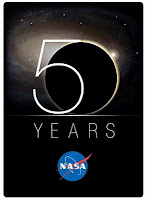When a CNN article broke today over NASA Administrator Charles Bolden’s concerns about job losses under Obama’s proposed budget (check it out: Budget of the United States Government, Fiscal Year 2011), my first reaction was of frustration and disgust.
“Always, they are stripping the space exploration budgets!” I cried. A quick dig into the Whitehouse.gov online budget tables yielded an Excel chart which shows a definite decline in NASA’s relative federal funding since the 60’s. Specifically, the space administration’s budget accounted for 4.4% of the entire Federal Budget in 1966 and was greater than 1.0% every year from 1962 to 1974. By contrast, NASA was allotted just 0.5% of the 2010 and 2011 Federal Budgets. “No wonder,” I fumed, “we haven’t been back to the moon or made any substantial breakthroughs in space travel and habitation.”
 Through gritted teeth I took a few moments to read over the President’s official justifications for the revised budget and rather unexpectedly found myself persuaded to agree. For whatever reasons (lack of funding, creativity, or competition), the truth is that NASA as it stands is not achieving its goals, nor is it remotely approaching what we as a nation are capable of. A few of the Funding Highlights, then:
Through gritted teeth I took a few moments to read over the President’s official justifications for the revised budget and rather unexpectedly found myself persuaded to agree. For whatever reasons (lack of funding, creativity, or competition), the truth is that NASA as it stands is not achieving its goals, nor is it remotely approaching what we as a nation are capable of. A few of the Funding Highlights, then:
- Adds $6 billion to NASA’s budget over five years and draws upon American ingenuity to enable us to embark on an ambitious 21st Century program of human space exploration.
- Embraces the commercial space industry and the thousands of new jobs that it can create by contracting with American companies to provide astronaut transportation to the Space Station—thus reducing the risk of relying exclusively on foreign crew transport capabilities.
- Ends NASA’s Constellation program, which was planning to use an approach similar to the Apollo program to return astronauts back to the Moon 50 years after that program’s triumphs. An independent panel found that Constellation was years behind schedule and would require large budget increases…
The point as I have come to understand it is that private, capitalistic competition has always been known to spur advancement and development, and it is being called upon now to resurrect the dying space exploration industry. While the government-supported (were we driven more by manifest destiny or a need to be stronger in the cold war?) NASA of the 60’s was viable and successful, a new economy and new world-view require new motivations for continued growth. Let a slightly-diminished NASA stick around as a prod and a partner in this new race for corporate development of space travel, says the government
Given human nature and the history of capitalism, I have no doubt it could work. The question is, will the investors buy it? Will the people show enough interest to motivate the investors to look to space for profit? Will the gains come quickly enough to justify investment of venture capital? The costs (and therefore stakes) are astronomical (no pun intended!), so as optimistic as I am, I still have reservations. As one that grew up in Isaac Asimov books, though, I hope with all my heart this new approach works to revitalize space exploration and travel.
What a perfect segue! The Norby Chronicles by Janet and Isaac Asimov are the very first Science Fiction books I remember reading – around the age of six. I credit them with sparking my love of physics and unlocking my imagination. That and Dr. Seuss, but that’s a different story. I strongly encourage anyone to either read these books or buy them for sons/daughters, nieces/nephews, and the children of friends. The series starts with this book, Norby the Mixed-Up Robot
.

Recent Comments